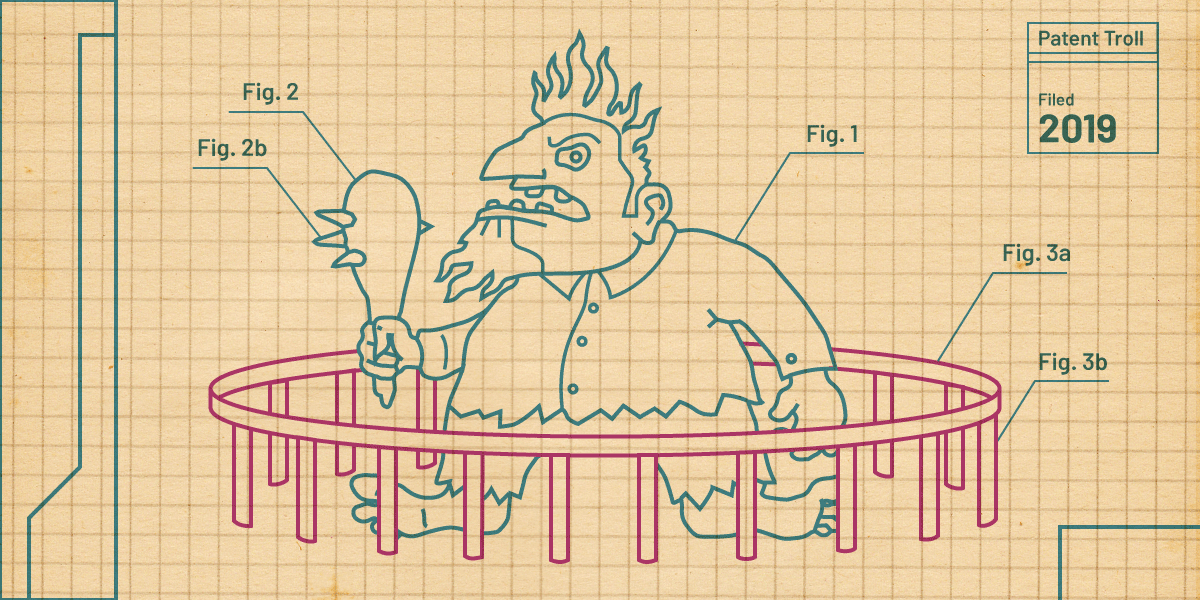The U.S. Patent and Trademark Office (USPTO) has proposed new rules that would effectively end the public’s ability to challenge improperly granted patents at their source—the Patent Office itself. If these rules take effect, they will hand patent trolls exactly what they’ve been chasing for years: a way to keep bad patents alive and out of reach. People targeted with troll lawsuits will be left with almost no realistic or affordable way to defend themselves.
We need EFF supporters to file public comments opposing these rules right away. The deadline for public comments is December 2. The USPTO is moving quickly, and staying silent will only help those who profit from abusive patents.
Tell USPTO: The public has a right to challenge bad patents
We’re asking supporters who care about a fair patent system to file comments using the federal government’s public comment system. Your comments don’t need to be long, or use legal or technical vocabulary. The important thing is that everyday users and creators of technology have the chance to speak up, and be counted.
Below is a short, simple comment you can copy and paste. Your comment will carry more weight if you add a personal sentence or two of your own. Please note that comments should be submitted under your real name and will become part of the public record.
Sample comment:
I oppose the USPTO’s proposed rule changes for inter partes review (IPR), Docket No. PTO-P-2025-0025. The IPR process must remain open and fair. Patent challenges should be decided on their merits, not shut out because of legal activity elsewhere. These rules would make it nearly impossible for the public to challenge bad patents, and that will harm innovation and everyday technology users.
Why This Rule Change Matters
Inter partes review, (IPR), isn’t perfect. It hasn’t eliminated patent trolling, and it’s not available in every case. But it is one of the few practical ways for ordinary developers, small companies, nonprofits, and creators to challenge a bad patent without spending millions of dollars in federal court. That’s why patent trolls hate it—and why the USPTO’s new rules are so dangerous.
IPR isn’t easy or cheap, but compared to years of litigation, it’s a lifeline. When the system works, it removes bogus patents from the table for everyone, not just the target of a single lawsuit.
IPR petitions are decided by the Patent Trial and Appeal Board (PTAB), a panel of specialized administrative judges inside the USPTO. Congress designed IPR to provide a fresh, expert look at whether a patent should have been granted in the first place—especially when strong prior art surfaces. Unlike full federal trials, PTAB review is faster, more technical, and actually accessible to small companies, developers, and public-interest groups.
Here are three real examples of how IPR protected the public:
- The “Podcasting Patent” (Personal Audio)
Personal Audio claimed it had “invented” podcasting and demanded royalties from audio creators using its so-called podcasting patent. EFF crowdsourced prior art, filed an IPR, and ultimately knocked out the patent—benefiting the entire podcasting world.
Under the new rules, this kind of public-interest challenge could easily be blocked based on procedural grounds like timing, before the PTAB even examines the patent.
- SportBrain’s “upload your fitness data” patent
SportBrain sued more than 80 companies over a patent that claimed to cover basic gathering of user data and sending it over a network. A panel of PTAB judges canceled every claim.
Under the new rules, this patent could have survived long enough to force dozens more companies to pay up.
For more than a decade, Shipping & Transit sued companies over extremely broad “delivery notifications”patents. After repeated losses at PTAB and in court (including fee awards), the company finally collapsed.
Under the new rules, a troll like this could keep its patents alive and continue carpet-bombing small businesses with lawsuits.
IPR hasn’t ended patent trolling. But when a troll waves a bogus patent at hundreds or thousands of people, IPR is one of the only tools that can actually fix the underlying problem: the patent itself. It dismantles abusive patent monopolies that never should have existed, saving entire industries from predatory litigation. That’s exactly why patent trolls and their allies have fought so hard to shut it down. They’ve failed to dismantle IPR in court or in Congress—and now they’re counting on the USPTO’s own leadership to do it for them.
What the USPTO Plans To Do
First, they want you to give up your defenses in court. Under this proposal, a defendant can’t file an IPR unless they promise to never challenge the patent’s validity in court.
For someone actually being sued or threatened with patent infringement, that’s simply not a realistic promise to make. The choice would be: use IPR and lose your defenses—or keep your defenses and lose IPR.
Second, the rules allow patents to become “unchallengeable” after one prior fight. That’s right. If a patent survives any earlier validity fight, anywhere, these rules would block everyone else from bringing an IPR, even years later and even if new prior art surfaces. One early decision—even one that’s poorly argued, or didn’t have all the evidence—would block the door on the entire public.
Third, the rules will block IPR entirely if a district court case is projected to move faster than PTAB.
So if a troll sues you with one of the outrageous patents we’ve seen over the years, like patents on watching an ad, showing picture menus, or clocking in to work, the USPTO won’t even look at it. It’ll be back to the bad old days, where you have exactly one way to beat the troll (who chose the court to sue in)—spend millions on experts and lawyers, then take your chances in front of a federal jury.
The USPTO claims this is fine because defendants can still challenge patents in district court. That’s misleading. A real district-court validity fight costs millions of dollars and takes years. For most people and small companies, that’s no opportunity at all.
Only Congress Can Rewrite IPR
IPR was created by Congress in 2013 after extensive debate. It was meant to give the public a fast, affordable way to correct the Patent Office’s own mistakes. Only Congress—not agency rulemaking—can rewrite that system.
The USPTO shouldn’t be allowed to quietly undermine IPR with procedural traps that block legitimate challenges.
Bad patents still slip through every year. The Patent Office issues hundreds of thousands of new patents annually. IPR is one of the only tools the public has to push back.
These new rules rely on the absurd presumption that it’s the defendants—the people and companies threatened by questionable patents—who are abusing the system with multiple IPR petitions, and that they should be limited to one bite at the apple.
That’s utterly upside-down. It’s patent trolls like Shipping & Transit and Personal Audio that have sued, or threatened, entire communities of developers and small businesses.
When people have evidence that an overbroad patent was improperly granted, that evidence should be heard. That’s what Congress intended. These rules twist that intent beyond recognition.
In 2023, more than a thousand EFF supporters spoke out and stopped an earlier version of this proposal—your comments made the difference then, and they can again.
Our principle is simple: the public has a right to challenge bad patents. These rules would take that right away. That’s why it’s vital to speak up now.
Sample comment:
I oppose the USPTO’s proposed rule changes for inter partes review (IPR), Docket No. PTO-P-2025-0025. The IPR process must remain open and fair. Patent challenges should be decided on their merits, not shut out because of legal activity elsewhere. These rules would make it nearly impossible for the public to challenge bad patents, and that will harm innovation and everyday technology users.



